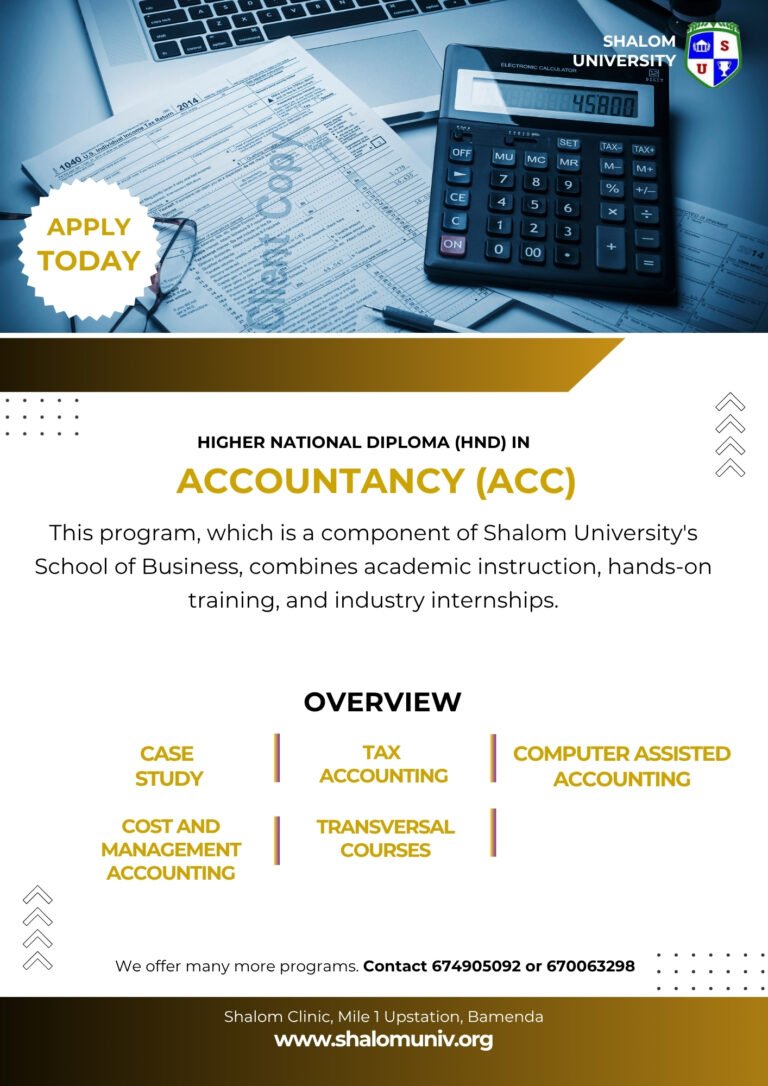In Cameroon’s dynamic economic landscape, the banking and finance sector is the engine that drives commerce and investment. The need for competent professionals who understand the complexities of financial markets, banking operations, and economic policy is paramount for fostering sustainable growth. Shalom University in Bamenda, recognizing this demand, offers a Higher National Diploma (HND) in Banking and Finance. This program is specifically designed to equip students with a blend of theoretical knowledge and practical skills, preparing them for a successful career in Cameroon’s fast-evolving financial services industry.
The curriculum at Shalom University is tailored to provide a deep understanding of banking and finance within the specific context of the Cameroonian market, including its unique regulatory environment, economic challenges, and opportunities. Graduates are prepared to serve in various roles, from banking operations and financial analysis to credit and risk management.
The BFI Curriculum at Shalom University
The HND in Banking and Finance program at Shalom University is structured around a set of core papers that guide students through the essentials of the financial world.
Paper: Case Study
The Case Study paper is a vital component that integrates all the theoretical knowledge and technical skills gained throughout the program. It challenges students to analyze complex financial scenarios, from assessing loan applications to evaluating investment opportunities. This is particularly relevant for banking and finance professionals in Cameroon, who must make critical decisions in an environment with its own set of economic and market conditions.
The course trains students to:
- Analyze real-world financial problems: Based on a given case, students evaluate the financial health of businesses or individuals, considering factors like creditworthiness, market conditions, and economic trends in Cameroon.
- Identify risks and opportunities: They pinpoint specific risks related to lending, investment, or market fluctuations and identify potential opportunities for growth and profitability.
- Propose evidence-based solutions: Students formulate practical recommendations based on banking regulations, financial principles, and economic theory. For example, a case study might involve analyzing a loan request from a local start-up, requiring an assessment of the business plan, market potential, and repayment risk within the local context.
- Defend their decisions: During formal presentations, students must justify their analysis and proposed solutions, demonstrating their critical thinking and communication skills, which are essential for client interaction and internal decision-making.
Paper: Banking Operations and Techniques
This paper provides students with a detailed understanding of the inner workings of a commercial bank. It covers the day-to-day operations, standard procedures, and technical aspects of banking services. For graduates entering the Cameroonian banking sector, this practical knowledge is essential for a seamless transition into the workplace.
Key topics include:
- Customer Service: The principles of effective customer interaction, which is a cornerstone of success in the competitive banking market.
- Deposit and Loan Processing: The procedures involved in managing customer accounts, processing deposits, and handling loan applications, a daily task in any bank.
- Electronic Banking: An introduction to the technologies and systems that drive modern banking, including ATMs, online banking, and mobile banking, which are becoming increasingly important in Cameroon.
- Security and Compliance: Understanding and implementing security protocols and adhering to regulatory compliance standards, including anti-money laundering (AML) and know-your-customer (KYC) regulations, which are crucial for maintaining trust and integrity.
Paper: Accounting and Finance
This paper provides the fundamental accounting and financial knowledge that underpins the banking and finance industry. A solid grasp of accounting principles is essential for interpreting financial statements, assessing financial health, and making sound financial decisions.
The curriculum covers:
- Financial Accounting: Principles of financial reporting, including the preparation and analysis of financial statements such as the income statement, balance sheet, and statement of cash flows.
- Corporate Finance: The principles of corporate financial management, including capital budgeting, working capital management, and financing decisions.
- Financial Analysis: Techniques for analyzing financial statements to assess a company’s performance, profitability, liquidity, and solvency, which is vital for lending and investment decisions.
- Investment Principles: An introduction to investment analysis, including different types of investments and risk-return trade-offs.
Paper: Monetary Economics and Banking
This paper provides a macroeconomic perspective on the banking and finance sector, focusing on the role of money, monetary policy, and the central bank (BEAC, the Bank of Central African States, for Cameroon). Understanding these broader economic forces is essential for making strategic financial decisions and understanding the regulatory environment.
Key areas of focus include:
- Monetary Theory: The role of money in an economy, theories of inflation, and the functions of a central bank.
- Monetary Policy in Cameroon: An examination of the monetary policy tools and strategies used by BEAC to manage the economy, control inflation, and support economic growth in the CEMAC region based on information from the BEAC.
- Financial Markets: An overview of the different types of financial markets, including money markets, capital markets, and foreign exchange markets, and their function within the Cameroonian and regional economies.
- Banking Regulation: The regulatory framework that governs the banking sector in Cameroon, including prudential supervision, deposit insurance, and other protective measures.
A Career in the Heart of Commerce
Graduates of the HND in Banking and Finance from Shalom University are well-prepared to enter the workforce in various roles within Cameroon’s financial sector. They can work in commercial banks, microfinance institutions, insurance companies, or investment firms. Their proficiency in banking operations, combined with a strong foundation in accounting, finance, and economics, makes them highly attractive to employers. The Case Study paper ensures that they are not just technically skilled but also adept at applying their knowledge to solve real financial problems and contribute strategically. By providing a practical and contextually relevant education, Shalom University plays a significant role in nurturing the financial expertise crucial for the sustainable economic development of Cameroon.


